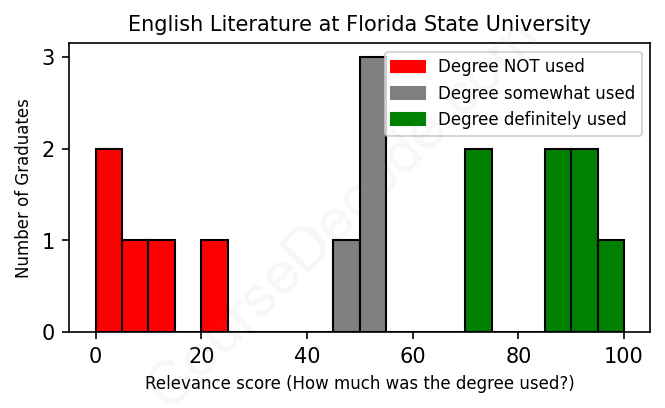
First, some facts. Of the English Literature graduates from Florida State University we've analyzed , here's how many have used (or NOT used) their degree in their career:

These are estimates based on AI analysis of 16 LinkedIn profiles (see below).
The verdict? Significantly below average. Overall, with an average relevance score of 52%, English Literature graduates from Florida State University have a much lower likelihood (-15%) of finding work in this field compared to the average graduate across all fields:
And for comparison, here's the chart for all profiles we've looked at across all degrees.
Also, after graduating, 43% of these graduates have pursued further education other than another Bachelor's degree (such as a Masters degree or other), compared to the average across all profiles of 35%. This suggests you may need more than just a Bachelors degree to be competitive as a English Literature graduate.
See the details:
|
Relevance score: 50% We think this person has gone into a career only somewhat relevant to their degree. We think this person has gone into a career only somewhat relevant to their degree.
DEGREE INFOGraduated in 2014 from Florida State University with a Bachelor of Arts (B.A.) in English Literature. No other secondary education since. JOB HISTORY SINCE GRADUATIONProduction Assistant American Idol Productions Jul 2014 - Jul 2014 Associate Producer  Sweet Tomato Films Sep 2014 - Present Production Manager  Southern Legacy Productions May 2019 - Present ABOUTHands on industry professional with experience at early stages of film development to principal photography through the distribution stage. I consider myself a Production Swing. I have skills and experience in Production Office, Accounting, Production Managing and ADing. Located in the St.Petersburg, FL area but is willing to temporarily relocate to other areas for production. |
The top 10 most common jobs done by the graduates we've analyzed (ranked most common to least) are:
When analyzing the job trajectories of Florida State University English Literature graduates, it’s evident that many have gravitated toward roles in the legal field. Positions like Legal Interns, Law Clerks, and even Assistant Attorneys appear quite frequently, which makes sense considering that the analytical and critical thinking skills honed while studying literature are directly applicable to legal reasoning and documentation. Overall, the legal jobs represent a strong connection to their degree, emphasizing how skills in reading, interpretation, and precise writing are crucial in that realm.
On the flip side, you also see a good number of graduates landing in roles such as Marketing, Sales, and Project Management where the link to English Literature isn’t as clear-cut. These positions may utilize some communication skills or creativity developed during their studies, but they mostly focus on business strategies. Teaching roles, particularly in English, are another notable category where they can fully leverage their expertise in literature. So, while a significant chunk of the job market for these graduates intersects with English Literature, many have pursued paths that only occasionally touch on their academic strengths.
Here is a visual representation of the most common words in job titles for English Literature graduates (this is across all English Literature graduates we've analyzed, not just those who went to Florida State University):

It looks like graduates from Florida State University with an English Literature degree have ventured into a pretty diverse range of career paths, particularly in the legal, education, and marketing sectors. For many, their first jobs right after college tend to be internships or entry-level roles that might not be directly related to literature but definitely tap into skills like communication and critical thinking that they honed during their studies. For instance, a number of alumni have kicked off their careers as legal interns or in marketing roles, which shows that they are finding ways to apply their English background in practical environments. Some have also transitioned into teaching, either as English language educators or secondary school teachers, which is kind of a natural fit for their degree.
Fast forward five or even ten years later, and it seems like a good chunk of these graduates have found themselves climbing the ladder into managerial or more specialized positions. Many who started in teaching have taken on higher roles in education, like academic advising, while others in marketing moved up to project management or communications specialists. On the legal side, there's a clear trajectory toward becoming attorneys, showing that those initial internships really paid off. However, it isn't all sunshine and rainbows—some have landed in jobs that seem pretty far from their English Literature roots, like retail roles or support positions that may not utilize their degree as fully as they might have hoped. Overall, while some graduates have successfully linked their degree to rewarding careers relevant to English Literature, others may have drifted into less specialized or even unrelated jobs over time. It's a mixed bag, but there are definitely solid successes too!
Honestly, a Bachelor’s degree in English Literature can be a mixed bag when it comes to difficulty, and Florida State University is no exception. You’ll dive into tons of reading, analyzing everything from classic novels to contemporary poetry, which can be pretty intense but also really rewarding. Some people find the writing and critical thinking skills you develop in these courses come naturally, while others might struggle with the heavy reading load and essays. It’s definitely not as cut-and-dry as, say, a science major where there are clear formulas and answers, but if you love reading and discussing ideas, it can be a lot of fun! Overall, I'd say it's about average in terms of challenge, especially if you're passionate about it.
Most commonly, in the LinkedIn profiles we've looked at, it takes people 4 years to finish a Bachelor degree in English Literature.
Looking at the job histories of these Florida State University English Literature grads, it seems like most of them are on a decent path to making good money, especially if they stick it out in fields like law or marketing. The legal folks have a strong trajectory, moving from internships to solid positions as attorneys, which can earn them a pretty penny down the road. Marketing roles also appear promising, with some climbing the ranks in their companies. Teachers generally don’t rake in the big bucks, but they often get stable jobs with benefits. Some career paths, like the ones in production and freelance, can be a bit unpredictable, but if they manage to land consistent gigs, they might do well too. Overall, while not every path screams "big money," many seem to be on track to make a comfortable living if they keep progressing in their fields.
Here is a visual representation of the most common words seen in the "about" section of LinkedIn profiles who have a Bachelor degree in English Literature (this is across all English Literature graduates we've analyzed, not just those who went to Florida State University). This may or may not be useful:

Here are all colleges offering a Bachelor degree in English Literature (ordered by the average relevance score of their English Literature graduates, best to worst) where we have analyzed at least 10 of their graduates: